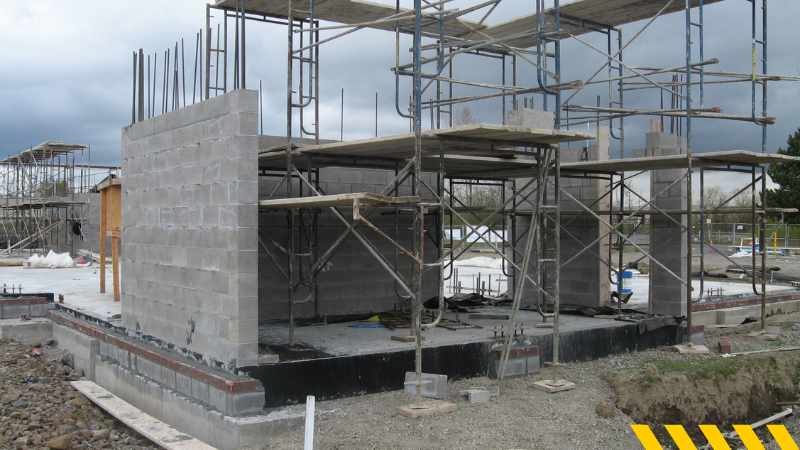
What is CMU in Construction?
Construction has seen a major shift over the past decade, with new technologies and methods being introduced to make the process more efficient, sustainable, and cost-effective. One such development that is gaining popularity in the construction industry is CMU also known as Concrete Masonry Unit.
CMU has been used for decades in various forms of construction but recently it has gained special attention due to its numerous benefits. From providing strength and durability to offering design flexibility, there is much to explore about this versatile material.
I will dive deeper into what exactly CMU is, how it is used in construction projects, and why it should be considered as a viable building option. So let’s cement our knowledge of CMU and discover why it is becoming a game-changer in the world of construction.
Understanding CMU (Concrete Masonry Unit) in Construction
In construction, CMU stands for Concrete Masonry Unit. It is a standardized building block made from concrete. It is commonly used in many construction projects. CMUs come in different sizes, shapes, and finishes. They are versatile in structures like walls, partitions, and facades. These blocks are durable. They resist fire and insulate sound. They have thermal mass. This makes them popular in homes and businesses.
Construction Estimating services are crucial as they help with accurately budgeting for CMU installations in construction. They use their expertise to measure materials and labour. They estimate equipment needs and track market prices. They provide detailed cost estimates for CMU-related tasks. We consider factors like block size, mortar type, and reinforcement needs. We also consider installation complexity. We do this to ensure that our cost projections are accurate. We analyze carefully and work with project stakeholders. Estimators help plan and do CMU construction projects well and within budget.
Types and Sizes of CMUs Used in Building Projects
Concrete Masonry Units (CMUs) come in a variety of types and sizes to meet the diverse needs of building projects. Each type of CMU has unique traits and benefits. They allow for flexible design, construction, and structure. Here are common types and sizes of CMUs used in building projects:
Standard Concrete Blocks:
Standard concrete blocks typically measure 8 inches in height, 8 inches in depth, and 16 inches in length. These blocks are versatile. They are widely used in load-bearing walls, foundations, and partition walls in homes and businesses.
Half-High Concrete Blocks:
Half-high concrete blocks are 8 inches in height, 8 inches in depth, and 8 inches in length. These blocks are small. They are often used for detailing, making bond beams, or adjusting wall heights in construction.
Split-Face Concrete Blocks:
Split-face concrete blocks have textured faces that provide a decorative finish. They are available in various sizes, including 4 inches, 6 inches, 8 inches, and 12 inches in height. These blocks are favoured for exterior facades. They are also used in landscaping and accent walls to improve looks.
Hollow Concrete Blocks:
Hollow concrete blocks come in various sizes. These include 8, 10, and 12 inches in height. They have standard depths of 8 and 16 inches. These blocks are light and insulate well. They are good for non-load-bearing partitions and infill walls.
Lintel Blocks:
Lintel blocks are typically larger, measuring 8 inches in height, 8 inches in depth, and 24 inches in length. Lintel blocks support loads above openings like doors and windows. They give strength and stability to the building envelope.
Estimators play a vital role. They estimate the quantity, cost, and labour needs for different sizes of CMUs in building projects. The services consider factors like block dimensions, finishes, reinforcement needs, and installation complexities.
Advantages of Using CMUs in Construction
Concrete Masonry Units (CMUs) offer a range of benefits that make them a popular choice in construction projects. CMUs have many advantages. They help with efficiency, durability, and looks. Here are some key advantages of using CMUs in construction:
-
CMUs are strong and durable. They are ideal for walls that bear loads and building structures.n They resist fire, moisture, pests, and harsh weather. This ensures they last a long time and need little maintenance.
-
CMUs provide great sound insulation. They reduce noise between interior spaces and improve comfort.
-
The heavy CMUs absorb and release heat slowly. This helps control indoor temperatures. It makes buildings use less energy and cuts heating and cooling costs.
-
CMUs resist fire naturally. They offer passive fire protection. They make buildings safer.
-
CMUs come in many sizes, shapes, colours, and finishes. They allow for versatile design and customization to suit styles and project needs.
-
CMUs can create varied textures and patterns. These enhance the look of building facades and interiors.
-
CMUs are cheap compared to other building materials. They provide a durable and strong construction solution at a fair price. Their long life and low maintenance needs cut costs over a building’s life.
-
CMUs are sustainable building materials. They can be made with recycled content. They help earn green building certifications.
-
CMUs are easy to install. They allow for fast construction and quicker project completion. This is compared to traditional masonry techniques.
Builders, architects, and developers can use CMUs in construction. They can create buildings that are strong and good-looking. The buildings are also sustainable and meet performance standards. They enhance comfort and last a long time.
To read more articles visit Liveblogaus
Conclusion
The term “CMU” in construction has a significant impact on the building process. From its unique composition to its versatility and durability, CMU blocks have become an essential component in constructing strong and resilient structures. Furthermore, we have delved into the benefits of using CMUs in construction, including cost-effectiveness, fire resistance, and insulating properties. Overall, it is evident that CMUs are more than just plain concrete blocks; they are integral elements in modern construction techniques that offer numerous advantages to both builders and property owners alike. So next time you see those grey rectangular bricks stacked together on a site or a beautiful finished building made out of these humble units remember that they are an essential ingredient in creating the physical spaces we live and work in every day.


